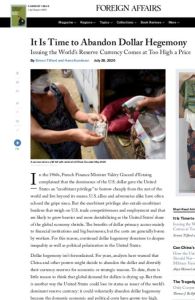Join getAbstract to access the summary!

Join getAbstract to access the summary!
Simon Tilford and Hans Kundnani
It Is Time to Abandon Dollar Hegemony
Issuing the World’s Reserve Currency Comes at Too High a Price
Foreign Affairs, 2020
What's inside?
The US dollar’s reign as the global reserve currency may be coming to an end.
Recommendation
In response to COVID-19, the American government has authorized trillions in monetary support for its economy, a move made possible in part by the US dollar’s status as the world’s reserve currency. Economists Simon Tilford and Hans Kundnani explore the benefits and disadvantages to the United States of that special position, and they examine whether it might be in the nation’s best interest to walk away from the role. Business executives, policy experts and economists will appreciate this informed and insightful report on the future of the US dollar.
Summary
About the Authors
Simon Tilford is the chief economist at the Tony Blair Institute for Global Change. Hans Kundnani is a senior research fellow at the Europe Programme at Chatham House.


















Comment on this summary